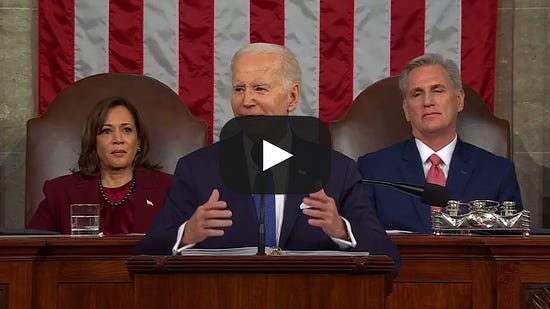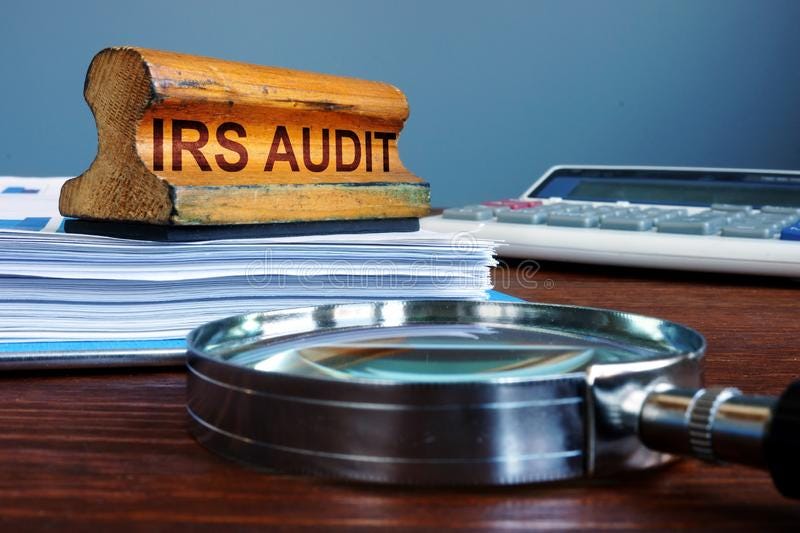Why the Poor Stay Poor in America - Taxes and Poverty
Welcome to Crime and Punishment: Why the Poor Stay Poor in America. I’m thrilled that you signed up to read my newsletter, and I hope that together, we can make a difference.
“IRS Audits Poorest Families at Five Times the Rate for Everyone Else." Based on IRS data reported to The Transactional Records Access Clearinghouse (TRAC) for FY 2021 I’m not going to comb the Internal Revenue Service (IRS) code for each section that hurts the poor or benefits the rich, because that would, well, take too long. But I will explore a few areas of the tax code that don’t seem to have a logical rationale behind them, meaning to evenhandedly maximize revenue for the treasury, rather than a seeming predilection to punish those who make the least money. Keep in mind that the IRS simply implements the laws dictated by Congress, like the tax structure and rate, although it does have latitude on how to implement those laws and can choose which taxpayers to audit. Starting with some good news: President Biden signed the Inflation Reduction Act in 2022, which allocated nearly $80 billion over 10 years to beef up the IRS, and over half of that amount is allocated to enforcement and audits, supposedly to focus on corporations and higher income earners. This is a much-needed influx of funds for the Service, because its budget has been gutted by Congress over the last ten years, which might explain the overall decline in audits, coupled with an uptick in audits of the poor. As this report from the Center on Budget and Policy Priorities explains, it takes extremely experienced auditors (revenue agents) to review corporate and higher income individual tax returns, and the money to hire these workers has been consistently slashed. Additionally, the number of taxpayers overall has not only increased during this time, but the number of millionaires has soared.¹ It turns out that the decrease in funding resulting in a massive loss of personnel, including the experts required to audit complex tax returns, has led the IRS to audit the poor more frequently, and particularly those claiming the Earned Income Tax Credit (EITC). This credit, while a boost for lower income workers (although in 2022, a taxpayer could earn up to $59,187 and still claim the EITC), is of course, only for those who work, which leaves out the disabled and others living on only social security, for example, and benefits taxpayers with children the most. And to add insult to injury, this recent article from Axios highlights a study showing that single, black men with dependents taking the EITC are the most likely to get audited of all taxpayers. Great. Most likely group to die at the hands of police and most likely to get audited by the IRS. The EITC, established in 1975, and the Additional Child Tax Credit (ACTC) an extension of the Child Tax Credit included in the 2021 American Rescue Plan Act, have helped millions of Americans make ends meet at tax time. But what “tax time” means has shifted a bit. It’s obvious that if you’re getting a tax refund, whether you’re claiming a tax credit, you’ll likely file your returns the second you receive your W-2, which is usually shortly after January 31 or before, and you force yourself to endure hours or even days of drudgery to file immediately, because you need that money as soon as possible. In 2017, however, the Protecting Americans From Tax Hikes Act (Path Act) went into effect, which requires the IRS to hold onto your refund until after February 15 of each year…while it checks for “Tax ID” theft, and more generalized fraud. Although not a horribly long time, it can delay the receipt of your entire refund from two to six weeks, depending on the year. According to Investopedia, the PATH Act delays these specific types of refunds because:
But can’t tax fraud occur under any scenario for these same reasons, and not just for filers claiming tax credits designed to help the poor? The (PATH) Act was signed into law in 2015 and does have some good points, like permanently extending the tax credits that help lower income taxpayers and small businesses, but to delay an entire refund to those who need it the most seems like overreach and proactive punishment to me. Another federal tax that directly impacts those who are in a bad financial position is the tax imposed on unemployment compensation benefits . Before 1979, unemployment benefits were not taxed at all by the federal government or states, but taxation was eventually phased in over the next few years. By 1987, the federal government taxed all unemployment compensation benefits, starting at a 15% tax rate and finally settling on a 10% tax rate in 1992. And most states that have income taxes (all but eight states), also tax unemployment benefits. I knew when I checked the legislative history behind the 1987 change, I would find this reason to justify taxing unemployment benefits:
This is a repeating thought pattern because the same rationale was used in 2021 by 26 states to cut off the extra $300 pandemic unemployment benefits a few months early, even though it was federal money, and the federal government paid all administrative costs associated with dispersing the funds. So getting a little extra money when you are unemployed during the most pervasive and deadly pandemic in over 100 years will disincentivize millions of otherwise healthy, previously employed workers from getting a new job. Keep in mind that most of these states cut of the extra funds in June or July of 2021, when the federal government ended the program on September 6 of that year, just two months later. To summarize, workers whose incomes are low enough to qualify for tax credits are audited more often than other taxpayers and treated like criminals who must wait for their tax refund while the IRS looks into the remote possibility they are frauds. And those who have lost their jobs through no fault of their own (otherwise, you cannot receive unemployment benefits), suddenly become glued to their couches, content to live off the paltry amount of benefits for the approximately six months they are eligible to receive them. Taking a look at the larger tax code, rather than focusing just on federal taxation is perhaps even more important to help understand how taxes impact inequality. This 2022 article from The Center for American Progress details five ways (different from the ones I’ve already discussed) our tax system benefits the rich and burdens or punishes the poor. I’ll discuss one of the five ways that is the most impactful —the payroll tax, defined as “…the taxes employees and employers pay on wages, tips, and salaries. These taxes include federal, state, and local taxes, as well as FICA taxes, which are taxes for Social Security and Medicare.” Although, the tax code is progressive, so that those earning more usually pay more, the more you earn from traditional employment where your employer automatically deducts the taxes you owe and pays them to the respective entities for you, and the lower your income (under $100,000/year), the higher percentage you owe in payroll taxes. The wealthy and uber-wealthy earn more of their income from stock dividends, interest, rental income and other passive income sources which are taxed in a different way and often at a lower rate. And because taxes on these passive income sources are not automatically deducted by an employer, the filer has access to loopholes and other deductions that benefit those earning this type of income. In President Biden’s State of the Union Speech earlier this year, he summed it up nicely.  ————————————————————————————— Let me know what you think of our tax system in the Comment Section below. Is the existing system fair to you and your family? What changes should be made to make it more fair? Have at it! As always, I appreciate your interest and thoughtful ideas that make our Crime and Punishment community a welcoming space to visit and chat. There’s no time like the present to become a free or paid subscriber…and there’s no time like the New Year to Upgrade your free subscription to paid — it’s easy, and will allow me to continue and expand Crime and Punishment. Thanks in advance for your support! 2 For a fuller explanation see: Joint Committee on Taxation, General Explanation of the Tax Reform Act of 1986 (H.R. 3838, 99th Congress; P.L. (99-514), JCS-10-87, May 4, 1987, pp. 29-30. You’re on the free list for Crime and Punishment: Why the Poor Stay Poor In America. All posts are free for now, but if you’d like to get ahead of the crowd, feel free to support my work by becoming a paid subscriber. | |||||||||||||||||||||||||||||||||||||||||||||||||
Older messages
A Mishmash of Monday Readings
Tuesday, March 14, 2023
Saving Dirt Roads, Banning Dollar Stores, A Bank Failure
Condominium Deconversion
Tuesday, March 7, 2023
Listen now (9 min) | Another Way Big Corporations Are Eating Into Private Home Ownership
Ohio's Toxic Train Derailment
Tuesday, February 28, 2023
Listen now (14 min) | This Environmental Disaster Could Happen In Your Backyard
Ending the Covid-19 Public Health Emergency
Sunday, February 19, 2023
It's More Than Just A Declaration
How Big Corporations Keep Us Poor...
Friday, February 10, 2023
Listen now (13 min) |
You Might Also Like
From “A First Glimpse of Ireland” by Dylan Brennan
Thursday, January 9, 2025
on a winter evening eyes see furthest / to a hummock of mist on horizon January 9, 2025 donate From “A First Glimpse of Ireland” Dylan Brennan on a winter evening eyes see furthest to a hummock of mist
The lemonade MVP
Thursday, January 9, 2025
— Check out what we Skimm'd for you today January 9, 2025 Subscribe Read in browser Together with my fitness pal But first: progress > perfection Update location or View forecast Quote of the
Join the Men’s Health Membership Today and Lock In This Special Price.
Thursday, January 9, 2025
Men's Health logo Men's Health MVP - Members Enjoy Exclusive Access to Content Don't miss out on everything Men's Health has to offer. Become a Men's Health MVP member and gain
Review: “A Very Nice Box”
Thursday, January 9, 2025
Laura Blackett and Eve Gleichman pull off a neat trick with “A Very Nice Box”. They manage to write an entire debut novel hitting every rom-com beat necessary and then flip it by turning the love
This Is How Fashion Girls Wear Button-Down Shirts Right Now
Thursday, January 9, 2025
What could be better? The Zoe Report Daily The Zoe Report 1.8.2025 a model wearing a white oversize button-down shirt with jeans (Style) This Is How Fashion Girls Wear Button-Down Shirts Right Now What
What to Clean in Your Home After Someone Gets Sick
Wednesday, January 8, 2025
Bing Is Tricking People Into Thinking They're Using Google. If you're under the weather, the last thing you want to do is clean, so start where it matters most. Not displaying correctly? View
Dear Poet 2025 and MLK Jr. Day
Wednesday, January 8, 2025
Find poems and resources for January Facebook Twitter Instagram January 2025 dear poet 2025 Dear Poet launches on January 22 and will feature Academy Chancellors Jericho Brown, Natalie Diaz, Kimiko
Zendaya Served Carrie Bradshaw In A Tutu — With An Edgy Twist
Wednesday, January 8, 2025
Plus, Selena Gomez's bridal minidresses, '60s-inspired nail art, your daily horoscope, and more. Jan. 8, 2025 Bustle Daily My husband ran a marathon. I still haven't recovered.
‘My Divorced Dad Bought a House With His Secret Girlfriend’
Wednesday, January 8, 2025
Today in style, self, culture, and power. The Cut January 8, 2025 ADVICE 'My Divorced Dad Bought a House With His Secret Girlfriend' I know you feel like it's your responsibility to tell
Writing a Non-Fiction Book?
Wednesday, January 8, 2025
Incase you missed it ͏ ͏ ͏ ͏ ͏ ͏ ͏ ͏ ͏ ͏ ͏ ͏ ͏ ͏ ͏ ͏ ͏ ͏ ͏ ͏ ͏ ͏ ͏ ͏ ͏ ͏ ͏ ͏ ͏ ͏ ͏ ͏ ͏ ͏ ͏ ͏ ͏ ͏ ͏ ͏ ͏ ͏ ͏ ͏ ͏ ͏ ͏ ͏ ͏ ͏ ͏ ͏ ͏ ͏ ͏ ͏ ͏ ͏ ͏ ͏ ͏ ͏ ͏ ͏ ͏ ͏ ͏ ͏ ͏ ͏ ͏ ͏ ͏ ͏ ͏ ͏ ͏ ͏ ͏ ͏ ͏ ͏ ͏ ͏ ͏ ͏ ͏ ͏ ͏ ͏


